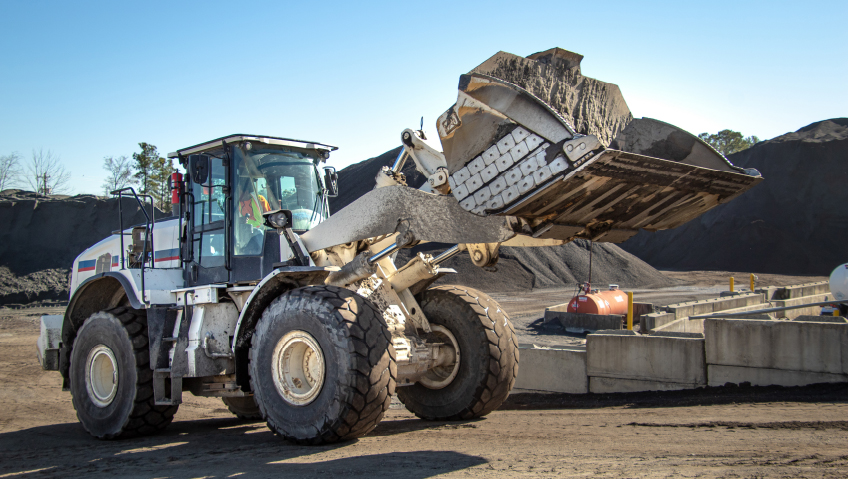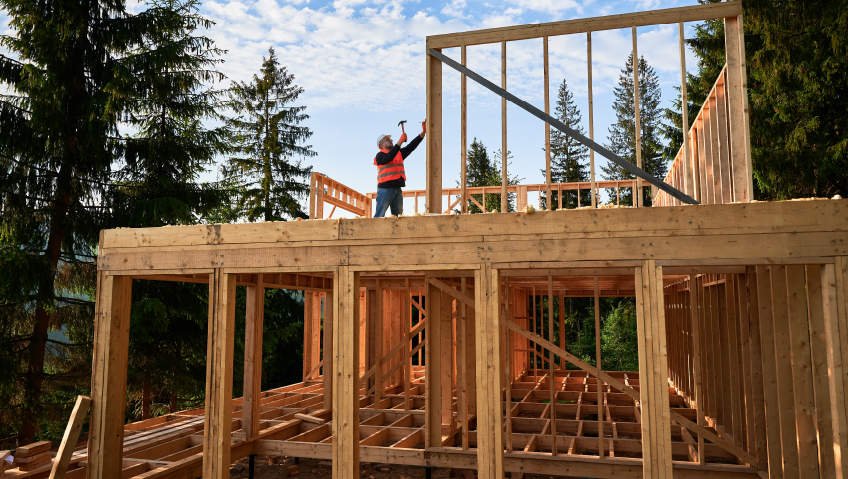Blythe Construction Inc. is one of the Southeastern United States’ leading heavy construction firms. Based in Charlotte, North Carolina, the full-service company takes on a complete range of projects from roadway, bridge, and railway construction to paving, drain systems, utilities, and more. Backed by a 101-year history and by parent company VINCI Construction USA’s global network, Blythe Construction plans and builds hundreds of projects each year throughout the region.
The ability to work in both the private and public sectors has helped keep the company ahead, especially during tough times. “We’ve got a lot of competition,” says Vice President Allen Hendricks. “A lot of companies that we compete with either just do almost all public or all private, and we found over the years, with economic downturns, that it is good to be involved in both. If the DOT has economic problems, there is still usually private work going, and vice versa. So, it gives us a good balance, and we can ride out those ups and downs in the economy.” The company’s work is about 60 percent public sector projects and 40 percent private.
Another factor that sets the company apart is that it produces its own asphalt. “This year we have 14 asphalt plants between North and South Carolina,” says Hendricks, “and we’ll do $350 million just on the asphalt side.” The team has been strategically growing this side of the business over the last two decades, and the effort has paid off dramatically. “When I started, 21 years ago, we had five asphalt plants, mostly around Charlotte,” he remembers. “We did about $35 million worth of work a year.”
Manufacturing asphalt in house gives the company greater control over quality and cost, and this has obvious advantages. “If we can control our cost to the best extent we can, we can be more competitive in the market,” Hendricks says.
Blythe Construction has been recognized by the industry numerous times for its work. Most recently, the company won a Quality in Construction Award from the National Asphalt Pavement Association (NAPA) for its work on I-85 in Davidson County, North Carolina. “We’ve had several Quality in Construction Awards over the years,” Hendricks shares.
Current notable projects include additional work on I-85 as well as the widening of I-485, which is “probably the most high-profile project around Charlotte right now,” he says. “That’s a big construction and asphalt project. It has almost 700,000 tons of asphalt on it.” Blythe Construction’s work on I-485 is expected to be completed in early 2025.
Whatever the project, the team is always dedicated to safety. “It’s the priority,” says Safety Manager Joshua Jones.
This robust commitment to safety is evident throughout the company, says Safety Director Ross Peters. “It’s our commitment at all levels of the organization, starting with our parent company, and more locally with our present CEO, Alan Cahill. Then it trickles down from there, down to the frontline employees where everybody is engaged in creating a proactive safety culture and a safe environment for our team and our subcontractors to work in every day.”
The company’s approach to safety is holistic. “The strength is there are many different parts that go into it,” Peters says. “It’s training. It’s culture. It’s leadership. All these things help us move forward. We don’t just focus on documenting safety tasks and think that’s it, or focus on safety equipment or PPE and think that’s the answer. We know that those elements are all a part of it, but we know that the team also needs to be aware, through training, of what the hazards are. Additionally, we need to effectively communicate all these elements and hold our team accountable to them in a safe and healthy way.”
Director of Training and Development Tracy Faithful makes sure the company maintains this focus on leadership when it comes to training. She points out that “the leadership development, the soft skills, as people refer to them, are actually the critical skills” that affect the entire company. “Leadership development is integral to our success; it’s our competitive advantage. Because if people don’t feel valued, appreciated, and respected, or find meaning in their work, they will leave the organization,” she says.
The team is not leaving any of this training up to chance. “By implementing evidence-based best practices from multiple disciplines, we’re able to identify gaps in our leadership, empower and grow current leaders, and develop the next generation,” says Faithful. “Tailored coaching and training give our people the support they need to reach their full potential as well as personal and professional goals.”
Of course, the technical side of training is vitally important too, especially when it pertains to safety. “I’m a big advocate of training,” says Jones. “There’s really no sense in focusing on a person’s conduct in the field and how many years of experience they have unless they’ve had proper training, and we have one of the best training programs I’ve ever been involved with.”
This top-of-the-line program always goes the extra mile. For example, when it comes to job safety analysis, “We don’t just hand them paperwork and expect them to know everything about it,” he adds. “We walk them through it… Same thing with our weekly safety talks. We change them up to keep them fresh, but at no point in time do we just hand them off and expect them to know what to do without proper training first.”
The company’s training also gives current employees a chance to move up in the company. “We want to be intentional about upskilling our existing teammates, helping them grow alongside the organization,” Faithful says. “They’ve been with us. They’re dedicated. They’re committed and want to grow.” These dedicated employees “may start, for example, on the end of this shovel today,” but can “end up being a loader operator or an excavator operator as the next step on their career path!”
To move up, employees engage in a combination of hands-on and classroom-based learning, including the use of simulators that can assess both skill and aptitude. “Simulators can assist with the development of muscle memory associated with heavy equipment operation, which helps tremendously before they take the proverbial iron seat on our field training site,” she notes. “Sustained and focused practice builds the confidence and skills essential to turn our people into operators.”
The company even uses a training and development worksite, “where they actually get on the equipment to train in a safe, controlled environment that replicates, as closely as possible, the conditions and tasks of actual job sites,” she explains. “By transitioning from classroom to simulators to the project training site, students can actually put into practice what they’ve learned. It’s the 70-20-10 rule; 70 percent of learning is on-the-job experience, 10 percent is classroom, and the remaining 20 percent comes from the relationships we build along the way from coaching, mentoring, et cetera.
After they move up in the company, these upskilled employees are supported with ongoing training. “Our people are the most precious resource and valuable asset we have. And our people appreciate, unlike our equipment, which depreciates,” Faithful points out. “Training’s not an expense, but an investment, an investment in all of our futures.”
As the company moves forward, this focus on safety and training will remain foundational to its success. “The push for a safe work environment is not going anywhere,” Peters says. “Everybody should have a safe place where they can work.”
After nearly a century of success, Blythe Construction will continue to invest in the dedicated employees who have brought the company this far, ensuring a strong future for many more years to come. “It’s all about our people,” Faithful summarizes. “We’re building our company one person at a time.”






